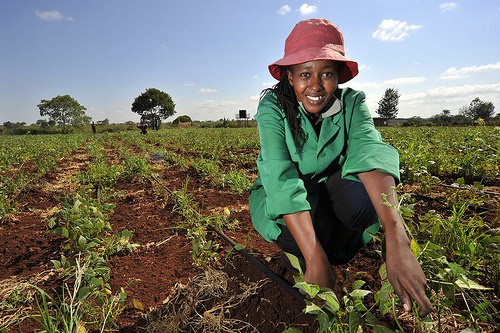Kenya
 Through the Feed the Future initiative women have access to the training they need to increase agricultural productivity.
USAID Kenya
|
More than 70% of Kenyans, mostly women, derive some of their income agriculture. They grow the food, prepare it, store it, and sell it. In addition to bearing heavy labor burdens on the farm, women also balance household chores and child care responsibilities.
Gender norms hold women back from reaching their maximum potential. Women have less access than men to credit, markets and training. Males typically control household income and assets, deciding how to allocate and spend the funds earned through their wives’ labor.
Women, especially those living in rural areas, often depend on land to generate income. Yet, in Kenya, women only own one percent of agricultural land – a small amount considering their crucial contributions to agriculture, food security and nutrition. Women’s lack of ownership and control over land represents one of the widest gender disparities in Kenya.
USAID is engaging women in the opportunities created by a growing economy. With a focus on small farmers, particularly women, Feed the Future drives agricultural growth and improves nutrition for thousands of families in Kenya. By 2015, we aim to lift 502,000 rural families out of poverty.
Almost half of the farmers we work with are female. We are helping them grow more, connect to markets and earn more.
In 2013, USAID:
- Helped over 228,000 female farmers adopt new methods of farming that contribute to higher incomes;
- Supported the enactment of two critical pieces of land legislation, both reaffirm women’s equal rights in property; and
- Assisted more than 105,000 women-owned, small businesses to access bank loans.
As the primary water collectors, food producers and wood gatherers for their households; women are the most affected when resources like land, water, trees and pasture are disrupted. This is why USAID also supports women taking a leading role in conserving Kenya’s natural resources; involving them in community governance structures and helping them earn money through nature-based businesses.








Comment
Make a general inquiry or suggest an improvement.